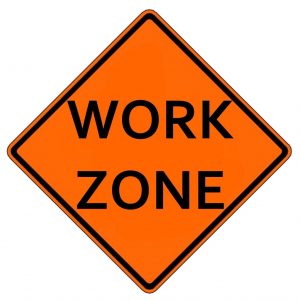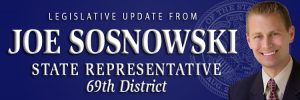Legislative Update for the Week of March 20-24
Please scroll below for selected updates on the state budget, jobs, cybersecurity in Illinois, a new pension reform proposal filed today, and a helpful guide on safe driving during the spring road construction season.
Budget – COGFA testimony
- Nonpartisan budget watchdog office testifies on FY17 budget situation. The Commission on Government Forecasting and Accountability (COGFA) presented FY17 and preliminary FY18 budget projections to the House Revenue and Finance Committee this week. COGFA, a nonpartisan economic watchdog office within the Illinois General Assembly, presented a revised estimate of $33.1 billion in FY17 general funds ($30.2 billion net of refund funds and non-general funds distributions) inflows for the fiscal year ending June 30, 2016. These numbers represented significant reductions from the FY17 preliminary estimates of $33.9 billion ($30.9 billion net of refunds/non-general funds distributions) published by COGFA in July 2016.
COGFA’s report that revenues are falling short of projections by approximately $800 million adds to the fiscal burdens facing the State. COGFA also warned House Revenue committee members that further extensions of these fiscal trends could further worsen this picture in FY18, the fiscal year that starts on July 1, 2017. Fiscal trends listed in this context include disappointing income tax receipts due to high unemployment and stagnant Illinois job growth, disappointing sales tax revenues, rising pension costs due to low interest rates and revisions to pension fund rates of annual return, and continued increases in the costs of all forms of medical care including Medicaid and health care for State employees. These fiscal trends add to the pressure facing Illinois lawmakers as they look towards resumption of Illinois as an operating entity with a budget process. The Illinois General Assembly continues to be stymiedin its efforts to enact a budget for FY18. The COGFA testimony was presented on Tuesday, March 21.
- New jobs created; economists continue to point to Illinois’ lagging job growth. The most recent report on Illinois’ creation of employment opportunities for job-ready residents, the Illinois Department of Employment Security’s February 2017 unemployment report, showed the Prairie State’s jobless rate dropping from 5.7% to 5.4%. The current number was measured by the widely-followed U-3 ratio; other methods of measuring unemployment and underemployment also count people in other categories, such as involuntary part-time employment. These alternative metrics show much higher jobless numbers in Illinois.
Illinois has not created nearly as many new jobs as have neighboring and other U.S. states. In a pattern of lagging recovery from the severe recession of 2009-10, Illinois has created only 47,000 new nonfarm payroll jobs over the most recently measured twelve-month period – job growth of 0.8%. Poor numbers are concentrated in many Downstate communities and metropolitan areas, with unemployment of 11.1% posted for January 2017 in greater Rockford, 7.7% in the Decatur area and 7.0% in Carbondale. In fact, Illinois has virtually the same number of nonfarm payroll jobs as the number of employment positions that were posted and paid more than 16 years ago, during the previous job peak of September 2000.
Pensions – New pension reform proposal introduced
- House Republicans Offer Comprehensive Pension Reform Proposal and CPS Relief. House Minority Leader Jim Durkin today called on Speaker Michael Madigan and the House Democrats to join House Republicans in passing comprehensive pension reform that would provide significant savings for taxpayers and $215 million to the Chicago Public Schools for a one-time pension parity payment. New legislation has been filed to accomplish this, House Bill 4027, co-sponsored by Rep. Joe Sosnowski.
With this legislation, we estimate the State of Illinois will realize short-term savings of $2.25 billion dollars from the general funds and a substantial step towards closing the deficit gap. This is a significant step towards achieving a balanced budget but also saving our pension systems. Our new bill is modeled after legislation introduced in a bipartisan manner in the Senate.
State Government – Cybersecurity
- Gov. Rauner announces cybersecurity initiative. The initiative, to be overseen by the new Department of Innovation and Technology (IDIT), will take numerous steps to improve the informational security of Illinois databases and electronic technology. The initiative is a response to exponential increases in the numbers of “hacking” and “phishing” assaults mounted daily upon Illinois state workers and systems, many of them carried out by electronic “bots.”
Under Gov. Rauner, Illinois has joined the list of U.S. states that have granted Cabinet rank to their chief information officer. IDIT, the Department that provides staff support to Illinois CIO Hardik Bhatt, has developed a comprehensive program of initiatives aimed at reducing risks to citizens, ensuring the delivery of state services, protecting critical State infrastructure, and improving enterprise resource planning. The challenge is significant. For example, IDIT director Hardik Bhatt has found that each State procurement operation has to travel through four separate software systems. Governor Rauner announced his cybersecurity initiative in Springfield on Tuesday, March 21.
Spring in Illinois – Work Zone Safety Guide
- Driving season is here; Illinois motorists reminded of safety laws. A one-page guide from Rep. Sosnowski’s office summarizes the safety laws to follow when in the presence of highway workers and work zones. Increased fines can be imposed for speeding in a work zone, including during hours when workers are not present in the zone. The fines for speeding in a construction zone/work zone start at $375 for a first offense, plus supplements imposed by the court. Photo speed enforcement machinery may be used. In addition, Scott’s Law requires a motorist to slow down and change lanes, if possible, to make way and create a zone of safety around emergency, construction, and maintenance vehicles. Additional fines are imposed for violations of Scott’s Law.

As always, if you have any questions or comments about the topics discussed in this newsletter, or any other part of state government, please do not hesitate to contact my office at (815) 547-3436 or email me at [email protected].
Sincerely,
Joe Sosnowski
State Representative
69th District


